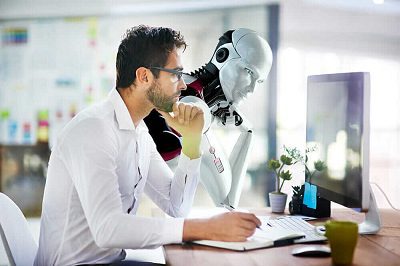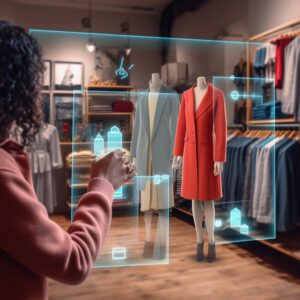 Retail, hospitality and other service-oriented industries have been seen as relatively immune to the job-killing effects of robotics, automation and AI. But as these technologies grow more sophisticated, retail’s resistance is weakening. Futurist Martin Ford, author of Rise Of The Robots: Technology And The Threat Of A Jobless Future, notes that robots are already reducing (or eliminating) the number of humans needed to do many jobs, including:
Retail, hospitality and other service-oriented industries have been seen as relatively immune to the job-killing effects of robotics, automation and AI. But as these technologies grow more sophisticated, retail’s resistance is weakening. Futurist Martin Ford, author of Rise Of The Robots: Technology And The Threat Of A Jobless Future, notes that robots are already reducing (or eliminating) the number of humans needed to do many jobs, including:
• Warehouse work;
• Checking in-store inventory;
• Providing customer service; and
• Staffing points of sale.
In an exclusive interview with Retail TouchPoints, Ford identifies the advances in robotics and AI that are accelerating the fastest. He also identifies a selection of job categories that are safe from the march of automation — at least for now.
Advertisement
Retail TouchPoints (RTP): You write in Rise Of The Robots that warehouse work and fast food are two places where we’re already seeing the impact of robotics on employment. Has that trend continued since the book came out in 2015?
Martin Ford: There have been advances in both areas, but the progress has had the most practical applications in warehouse work. You can find videos on YouTube showing robots moving boxes around. Nearly all the main distribution warehouses are automated to some extent, for example by bringing shelves to workers who then reach in and grab the items they need. I really think Amazon’s warehouses will get more efficient and less labor-intensive, which directly impacts Walmart.
In order to respond, traditional retailers with stores also will have to become more efficient. Walmart and others have been testing robots for taking store inventory by counting the things that are on the store shelves. Part of the nature of robotics is that it’s easier to make one designed just to observe something, versus building a robot that physically does something like pick up a box. Eventually, however, robots will be unloading trucks or putting items on shelves, particularly in areas where the products are standardized. That’s probably inevitable.
In the fast food area, there are at least three startups in terms of actually preparing food. Momentum Machines, now called Creator, has a robot that shapes burgers from freshly ground meat and grills them to order, and it can produce 360 burgers per hour. They just opened a storefront in San Francisco in order to test the technology. There’s also a company called Zume that is using robots to make pizzas. Their business model is to put the uncooked pizzas in a van equipped with an oven and have it cooked while it’s on the way to the delivery destination, so that it’s virtually right out of the oven when you get it.
RTP: You also write about the impact of cloud robotics, which migrates the intelligence needed to animate mobile robots to a centralized hub, as a technology that’s likely to affect jobs. Why is this technology important?
Ford: Some people say ‘Well, I might lose my job doing such-and-such, but I can get a job fixing the robots.’ It’s true that repair and maintenance will create some jobs, but certainly not as many as will be lost. Take the Redbox video boxes, which can sense when there’s a mechanical or software issue with one of them and send an alert about that. All of these types of systems will be built in a way that’s very modular and easy to maintain, probably remotely and in some cases autonomously. That’s a part of the business model.
RTP: Are there jobs where we might be surprised to see robots, AI or other technologies replacing humans?
Ford: People have been biased toward the idea of robots taking away blue-collar jobs, like warehouse workers, or truck drivers with self-driving vehicles. There’s not enough focus on the person that sits in a cubicle, whose job is a lot easier to automate in many ways. For one thing, as opposed to a self-driving car, if the machine makes a mistake, nobody gets injured or killed. People who are analysts cranking out reports, or putting data into an understandable format, in areas like accounting, finance and banking — all of these jobs will be increasingly susceptible to becoming automated.
We’re already seeing it in customer service. When you call a company for technical support, it’s increasingly likely that you will be talking to a machine, and it’s not clear whether that will be disclosed to the consumer. These solutions could get good enough so that people wouldn’t be able to tell, especially when the conversations are limited in terms of the topic areas.
RTP: Are there retail jobs that might be considered “safe” from automation?
Ford: Jobs involving creative and strategic thinking are one area. Another is jobs involving interacting with people, particularly if you need to build a sophisticated relationship, as in high-end retail. Another area is jobs where there’s a lot of mobility and dexterity involved. Outside of retail that would be electricians and plumbers, but even something like stocking shelves — particularly in a smaller store that has a lot of different products and different-sized shelves — will still need people. Also, the person that goes into the fitting room to restock shelves with clothes that are all in a jumble — pretty much anything that requires flexibility and dexterity in unpredictable environments is fairly safe.
RTP: What are some of the likely effects of a jobless future?
Ford: Workers are consumers, and the main way we get money into the hands of these consumers is their jobs. As these jobs go away or as wages fall, things become increasingly unequal. We’re already seeing the impact of inequality — I’ve seen surveys saying that the average person would not be able to come up with $500 in case they needed to fix a car or had medical expenses. If people have no discretionary income, they’re not driving the economy, because these people are really only buying essentials.
RTP: Do you feel that people are underestimating how quickly the impact of robotics and automation will be felt on a large scale in the economy?
Ford: I think there is growing awareness of these issues. When I do speaking engagements or I talk to politicians, they are very interested in the topic.
However, I worry that with the economy doing well and with a record low unemployment rate in the U.S., people are somewhat complacent. But the economic recovery won’t go on forever. The downturns are when a lot of the consolidation and assimilation of jobs happen. Companies deploy the technology after laying people off, and then when the economy picks up again they find that they don’t have to hire people back.
Even with today’s low unemployment, many economists are mystified as to why that hasn’t led to wage growth. A tight job market should be putting tremendous pressure on wages, and we’re not seeing that. One reason is that we also have to worry about the labor force participation rate. The unemployment rate only measures those that are looking for jobs, not those that have essentially left the workforce. The downward trend there is all related to the impact of technology.









